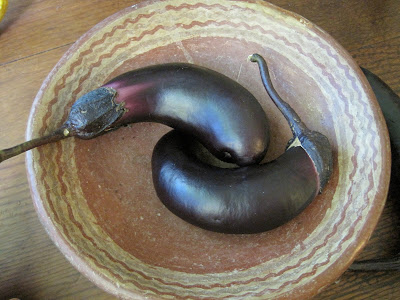 I picked up some beautiful small eggplants at the farmers' market this morning. They were so beautiful I had a hard time cutting into their tender, black flesh. The small Japanese eggplants are my favorite- sweeter and more tender than the usual Globe varietals commonly found. The skin of the smaller varietals is usually tender enough to eat, which is good because most of nutrients in eggplants are found in the skin- potassium, B-vitamins and phytonutrients.
I picked up some beautiful small eggplants at the farmers' market this morning. They were so beautiful I had a hard time cutting into their tender, black flesh. The small Japanese eggplants are my favorite- sweeter and more tender than the usual Globe varietals commonly found. The skin of the smaller varietals is usually tender enough to eat, which is good because most of nutrients in eggplants are found in the skin- potassium, B-vitamins and phytonutrients.
I found this recipe in one of my favorite Japanese cookbooks, Harumi's Japanese Home Cooking. Her book is simple and elegant, which this recipe perfectly exemplifies.
Nasu dengaku is the Japanese name for this dish. "Dengaku" is a sweet, simmered miso sauce that is traditionally used to coat grilled meat and vegetables.

Eggplant "Dengaku" Style
Serves 2
6 tablespoons miso (hatcho or red)
4 tablespoons sugar
4 tablespoons mirin
2 tablespoons sake
1 large globe eggplant or 4 small, long eggplants
3 tablespoons sunflower or other high-heat oil
toasted sesame seeds
To make the dengaku: mix the miso, sugar, mirin and sake in a small pan over medium heat. Stir for a few minutes to combine and thicken. Turn off heat.

Cut the eggplant or plants in half lengthwise and then run a knife around the
inside of the eggplant, loosening the skin from the flesh. Score the surface of the eggplant a few times with a knife.
Heat the oil in a frying pan and add the eggplant, flesh side down, and brown. Then turn over, loosely cover and continue cooking until almost cooked.
Spread the dengaku miso on each half the eggplant. Cook under the broiler or on a hot grill for about 5 minutes.
Sprinkle with toasted sesame seeds.
Eat with a spoon.

Choosing an EggplantIn choosing an eggplant there are a few things to look for. Often eggplants are sold overripe and old. Eggplants don't store for very long, so look for the freshest ones you can find. Whatever the variety, smaller eggplants are generally better. Choose eggplants that are firm and heavy for their size. As an eggplant ages it gets puffy and bitter. You can test this by gently pushing with your thumb- if the flesh gives slightly but bounces back, it is ripe. If the indentation remains then it is overripe, and it will likely be mushy inside. If it doesn't give, it was picked too early and is unripe.

